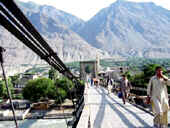The fall of Gilgit
The Fall of Gilgit
Image
The entire north-west of the Indian sub-continent was, in the autumn of 1947, aflame with communal riots. In October 1947, the disturbances spread to the State of Jammu and Kashmir also. The Gilgit area of the State had an overwhelmingly Muslim population, made up of turbulent hill-men. The position was complicated by the existence of the semi-feudal principalities of Chitral, Hunza, Nagar, etc., which had been brought under Dogra rule in the 19th Century.
In July 1947, Gilgit was still being administered by the Government of India, to whom it had been made over by the State Government on lease for 60 years. The departure of the British from India being imminent, it was decided to terminate this lease and hand Gilgit back to the Maharaja of Jammu and Kashmir. Late in July 1947, the State Government appointed Brig Ghansara Singh, one of the most senior officers of the State’s Force, to be the Governor of Gilgit. He flew to Gilgit on 30 July 1947 and took over the administration from Lt. Col. Bacon, the then British Political Agent, on 01 August 1947.
The local people, even though overwhelmingly Muslim, joyously welcomed the return of the Maharaja’s administration after the period of British rule. Of the subordinate chiefs under the Governor of Gilgit, namely, the Mir of Hunza, the Mir of Nagar, the Raja of Punial, and the chieftains of Koh Ghizar, Yasin and Ashkoman, only the Mirs of Hunza and Nagar were hostile. Their hostility proved very damaging, for three-fourths of the men of the Gilgit Scouts came from Hunza and Nagar, and Subedar Major Babar Khan of the Scouts was the uncle of the Mir of Nagar and had married the sister of the Mir of Hunza.
The two British officers of the Gilgit Scouts whose services had been retained by the State, namely Major W.A. Brown and Captain Matheson, proved themselves inveterately hostile to Jammu & Kashmir State and took the leading part in the pro-Pakistan treachery at Gilgit. The predominantly Muslim civil employees of the Government of Gilgit were also pro-Pakistan and they backed the demands of the Scouts for special rates of pay and other concessions for serving the Jammu & Kashmir State soon after Brig Ghansar Singh took command.
It should be noted, however, that the Gilgit Scouts and the local people were still free from the violent communal passions then sweeping through the Punjab and did not favour killing or converting by force the non-Muslim of Gilgit.
Not so for the State’s own Muslim troops. Gilgit area was garrisoned by 6 J & K Infantry, less about two companies with Headquarters at Bunji about 54 kms from Gilgit on the road to Srinagar. Commanded by Lt. Col. Abdul Majid Khan, the battalion was composed of Muslims and Sikhs in almost equal proportions. The Muslim companies had men from Poonch and they, having heard all about the horrible communal killings in the Punjab, were in a violently communal frame of mind.
Wild rumours raged in Gilgit in the last week of October when the tribal invasion of Kashmir began. The populace remained friendly, but there was clear evidence that Major Brown and Sub Major Babar Khan of the Scouts were planning some trouble. Some locals advised the Governor to call up 6 J&K Infantry from Bunji, but Brig Ghansara Singh realised that the State Force’s Muslim men were as disaffected as, and more violent than, the Scouts themselves. The Sikhs of 6 J&K Infantry could not be called due to the opposition of Lt Col Abdul Majid Khan, the Commanding Officer.

